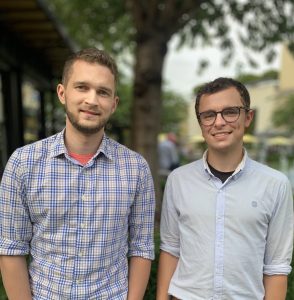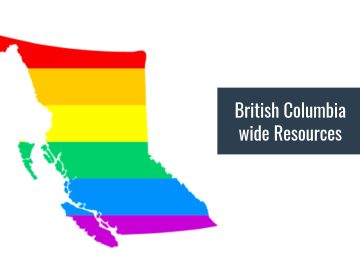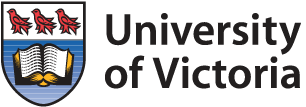Update: QCHAT opened its peer-support lines on October 7, 2019. You can find the support email address, toll-free phone number, and text contact on the qchat.ca homepage.

Conor Zeer-Wanklyn (IMP Class of 2021) and Victoria entrepreneur Corey McPherson, co-founders of QCHAT.
Growing up is hard for everyone, but teenagers and young adults who identify as lesbian, gay, bisexual, trans, queer, or two-spirited (LGBTQ2) often face additional risks.
Canadian Mental Health Association Ontario reports LGBTQ2 youth are more likely to experience sexual harassment, bullying, physical abuse, and discrimination, and they face approximately 14 times the risk of suicide and substance abuse than their heterosexual peers. Many youth also report engaging in more high-risk sexual activities. The Canadian Observatory on Homeless estimates between 25 – 40% of homeless youth identify as LGBTQ2.
If left unaddressed, these risks often continue into adulthood. Statistics show LGBTQ2 people have higher rates of depression, anxiety, chronic stress and loneliness, and phobic disorders, and are twice as likely to develop post-traumatic stress disorder as heterosexual people.
To help ensure LGBTQ2 youth in BC get support they need to navigate these health risks, Conor Zeer-Wanklyn (IMP Class of 2021) and Victoria entrepreneur Corey McPherson created QCHAT. A non-profit, low-barrier referral and peer support program, QCHAT will allow youth to confidentially contact volunteers via chat lines, email, phone, or text.
“QCHAT is designed to engage with those who may find it difficult to reach out to a loved one or a friend to discuss topics that are integral to their own personal development,” says Conor.
 “[C]oming out, confusion about sexuality and gender identity, relationships, and safety at home or elsewhere are topics that play an important role in the health and well-being of youth. We aim to be a low-barrier, non-judgemental, youth-positive service that youth in these situations can reach out to as a first point of contact – and for ongoing peer support if they are dealing with ongoing problems or isolation. Chronic loneliness does have a known association with poor mental health outcomes in several populations, including LGBTQ2 youth populations, and is something we’d like to champion with our BC-wide service.”
“[C]oming out, confusion about sexuality and gender identity, relationships, and safety at home or elsewhere are topics that play an important role in the health and well-being of youth. We aim to be a low-barrier, non-judgemental, youth-positive service that youth in these situations can reach out to as a first point of contact – and for ongoing peer support if they are dealing with ongoing problems or isolation. Chronic loneliness does have a known association with poor mental health outcomes in several populations, including LGBTQ2 youth populations, and is something we’d like to champion with our BC-wide service.”
Along with emotional support, volunteers will also provide youth with referrals to LGBTQ2-focused and -friendly resources. The referral database, which is already available on the QCHAT website, includes services like counselors and crisis lines, peer groups, safe-sex and harm reduction programs, clinicians, and health centres.
LGBTQ2 individuals of all ages face barriers when it comes to accessing healthcare services. A 2015 position paper from the Canadian Federation of Medical Students lists fear of victimization, stigma, and negative judgement as some of these barriers. A combination of past experiences with healthcare services and cultural, religious, and personal beliefs can also affect a person’s comfort in accessing healthcare.
 “These referrals have the ability to help clients in tangible ways,” Conor says. “We believe that QCHAT has the ability to help improve the health and well-being of LGBTQ2 youth in BC.”
“These referrals have the ability to help clients in tangible ways,” Conor says. “We believe that QCHAT has the ability to help improve the health and well-being of LGBTQ2 youth in BC.”
QCHAT is based on a similar service in Ontario called LGBT YouthLine, which Conor volunteered with when he lived in Toronto. When he couldn’t identify a peer-support service like this in BC, Conor decided to create on as his medical school FLEX project under the supervision of Dr. Danika Milne. “Doing this wouldn’t have been possible if I didn’t have a chance to use some UBC Medicine curricular time towards it,” he says.
QCHAT is now an approved not-for-profit and it received its first year’s worth of funding from the Island Health Community Wellness Grant. All it needs now are Victoria-based volunteers to staff the lines.
“We have a volunteer call out page on the website, which describes the types of skills and qualifications that we’re looking for in prospective volunteers, in addition to the kinds of outcomes that we’re looking for our volunteers to achieve. We believe that QCHAT will be of interest for those who have a service ethic, as well as those who want to build their competency in non-profit business management and leadership, since there are ample opportunities to build the organization into a sustainable and impactful force for good,” Conor says.
As QCHAT is a peer support service, it will prioritize LGBTQ2 volunteers aged 30 and under. However, older individuals are still encouraged to get in touch and discuss how they could assist the organization.
To access any of QCHAT’s resources or to find out more about volunteering, please visit qchat.ca.
